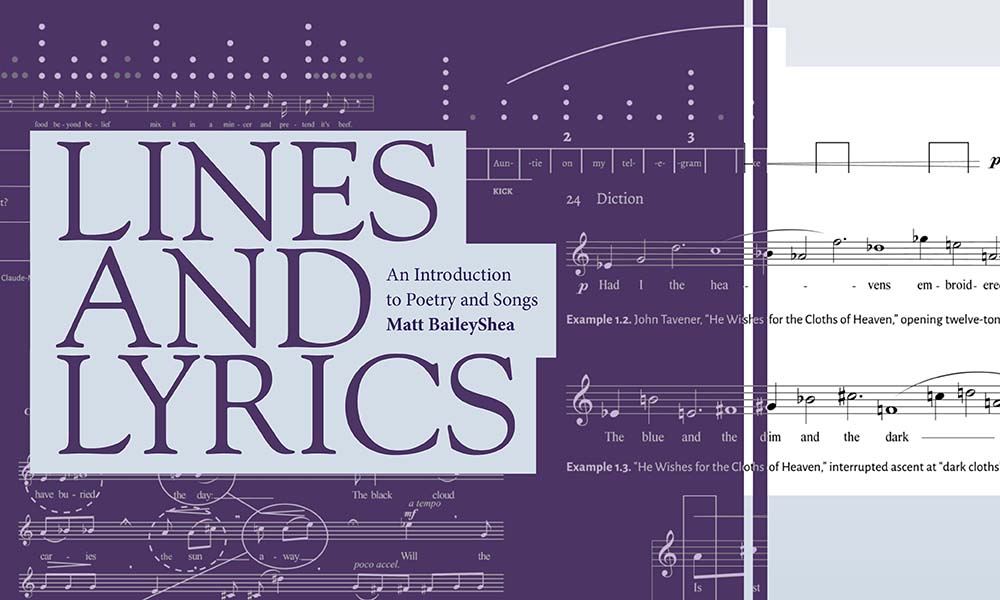A Rochester poet ‘explores the lighter side of dark times’ with her latest collection of poems.
Sometimes, procrastination pays off—at least it did for Melissa Balmain.
Balmain, now an instructor in the Department of English at the University of Rochester, was writing the book Just Us: Adventures and Travels of a Mother and Daughter (Faber & Faber, 1998) when she learned that two friends from college were writing and sharing short comic poetry via email. Thinking she had discovered a fun way to procrastinate, Balmain contributed a few poems. Then a few more. And some more after that.
While she did manage to finish her book, she also started a new career as a light-verse poet.
“I was always writing some kind of poetry or lyrics, and it was almost always comic,” says Balmain. “But it wasn’t until I was in my 30s that I started writing a lot of comic poetry.”
She hasn’t stopped writing since. Her latest book, Satan Talks to His Therapist (Paul Dry Books, 2023), “explores the lighter side of dark times.” Those dark times, described by Balmain as a “descent to hell,” included climate change, crazy politics, and the modern plague, better known as COVID-19. Yet that descent is followed by a poetic effort to climb out from the depths, albeit with some side trips to Limbo along the way.

“Many of us have coped by relishing the good that’s in the world, whether that’s family, great works of art, or humor, even silliness,” says Balmain, who was experiencing some major changes in her personal life, including a looming empty nest. She herself embraced humor and silliness as a both a coping mechanism and creative fuel, which resulted in more than a few poignant observations that crop up in her latest book.
The collection opens with “On Looking at an MRI Cross-Section,” a poem juxtaposed with an image from an MRI scan of the author’s brain, one that was taken when Balmain was experiencing unusually severe headaches. While no brain abnormalities were discovered, Balmain nonetheless found the episode “a little bit paralyzing.”
“This is a very good example of seeking humor in a subject that is absolutely terrifying,” says Balmain. “The scan showed all these objects in my brain. Then I started to think how those freaky objects are the very things generating my poem.”
Satan Talks to His Therapist touches on a wide variety of topics, including Shakespeare, Niagara Falls, donuts, middle age, grief, birdwatching, and pandemic-era masks. Most of the 63 offerings are humorous—85 percent by Balmain’s estimation. That should be no surprise, considering how she’s wired. “I discovered pretty early on that if I was being funny, I got people’s attention,” explains Balmain. “It’s just natural for me to seek the humor in situations, sometimes as a coping mechanism.”
But don’t mistake comic poetry—or light verse—as something trivial or carefree. Balmain is constantly working to dispel that assumption. As she says, “My favorite kind of light verse wrestles with something true about the human experience, whether that’s society or human nature.”
Balmain has had her share of professional experiences that inform her writing. In addition to a brief stint as a mime during and after college, she’s been a journalist; newspaper columnist; college professor; and is now the editor-in-chief of America’s longest-running journal of comic verse, Light.
Once she discovered the satisfaction of light verse, Balmain got serious about the not-so-serious. She wrote two books of poems: Walking in on People (Able Muse Press, 2014) and The Witch Demands a Retraction: Fairy Tale Reboots for Adults (Humorist Books, 2021). Over the years, her writings, including prose, have also appeared in, McSweeney’s Internet Tendency, The New Yorker, The New York Times, and The Washington Post, among other outlets.
The groundwork for her success was laid in her early school years when she would read authors like Dorothy Parker, Erma Bombeck, and Russell Baker, and listen to the (often humorous) lyrics of Stephen Sondheim and Tom Lehrer. As an undergraduate at Princeton University, she took courses with writing luminaries, including John McPhee, Sandra Gilbert, Russell Banks, and Joyce Carol Oates. Her education continued after college, when she had opportunities to study with poets Dick Davis, Rhina P. Espaillat, Emily Grosholz, R.S. Gwynn, X.J. Kennedy, Joshua Mehigan, and Timothy Steele.
Having learned the craft of writing from accomplished writers and poets, Balmain’s career came full circle in 2010 when she joined the English department faculty at the University of Rochester as an adjunct instructor. Among the courses she teaches is a 200-level class on humor writing.
“It’s a matter of helping people to do the most they can with what they have. Will I be able to turn Debbie Downer into Tina Fey? Probably not,” says Balmain. “But I do think that with techniques that we study in class, it is possible for someone to be funnier on the page.”
One of those techniques—the most important one, according to Balmain—is generating surprise. “If it doesn’t surprise your readers, they’re not going to laugh.”
Laughter is one of the main objectives of her latest project. She’s working with the managing editor of Light to compile an anthology of the journal’s best poetry since 1992.
When she’s not editing and teaching, Balmain will continue writing. Because, as she says, “People who write poems are always writing poems.”
Read more
 Mortality informs creativity in poet James Longenbach’s latest collection
Mortality informs creativity in poet James Longenbach’s latest collection
Written in the aftermath of a cancer diagnosis, Forever is the University of Rochester English professor’s sixth book of poems.
 English professor’s cotranslation of poetry wins PEN American Literary Award
English professor’s cotranslation of poetry wins PEN American Literary Award
Everything I Don’t Know, translated from the Polish by Jennifer Grotz and Piotr Sommer, took top honors for poetry in translation in 2022.
 Taking a page from poetry to understand the music
Taking a page from poetry to understand the music
A University of Rochester music theorist explores the interrelationship between poetry, lyrics, and music.





